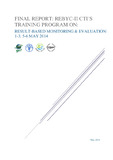| dc.description | GEF, FAO and SEAFDEC jointly carry out the REBYC-II CTI project which aims to enhance trawl fisheries management in five (5) participating countries namely Indonesia, Papua New Guinea, Philippines, Thailand and Vietnam. The project was at its mid-term evaluation stage in which the 5 member countries reported results generated from project activities carried out at local level.
Regional Facilitation Unit (RFU) of the project has observed the findings from the Mid-Term Evaluation (MTE) that the outcomes of the country’s projects were not responded to the project’s goals. Many planned activities were delayed and objectives of the project has not been met because of various reasons, for instance, delayed in funds disbursement, lengthy administrative processes of national organizations, national projects are not aligned with country’s policies / interests, etc.
The MTE also revealed that report format and contents were different from country to country. The project’s management office had difficulties in understanding the status of the projects and it was hard to consolidate the outcomes into the big picture. Most of the outcomes showed that the in country reports were subjective and had little connection with the project goals.
The REBYC-II, unlike REBYC-I, incorporates ecosystem approach in reduction of bycatch in trawl fisheries. However, the outcomes emerged from countries’ projects had not reflected adoption of socio-economic and governance dimensions during project implementation. These two dimensions are vital parts of the ecosystem approach emphasized by REBYC-II.
At the beginning, the project specified three (3) components that each country has to report on. The components composed of 1) Agreed regional bycatch policy/strategy and national or area specific trawl fisheries bycatch management plans that are in line with the International Guidelines on Bycatch Management and Reduction of Discards, 2) Measures that manage bycatch and reduce discards, and thereby improve fisheries resources and ensure long-term economic sustainability of trawl fisheries, 3) Standardized data for key indicators, including on economic performance, are available in all project countries and inform trawl fisheries and bycatch management planning and implementation at national and regional levels, and 4) Enhanced knowledge and understanding of responsible fishing by private sector/fishers, fisheries managers and decision-makers.
It was found from country’s reports that the outcomes of the projects did not have coherent with those components
This training intervention on Result-based Monitoring and Evaluation was the mean to align MTE’s findings with REBYC-II’s goals. The training also provided methods and tools to revisit project goals and validate relevance of project objectives. It provided opportunity for member countries to address gaps and set clearer aims for future national action plans. The training aimed to enable project staff to select appropriate indicators and use them to describe progress and lessons gained from the projects at national level. The clearer elaborations on the outcomes and their evidences, the better the report on the REBYC-II’s outcomes are.
The training program was a part of three (3) post mid-term evaluation interventions implemented by REBYC-II. The first part (6 days) was a training workshop on Ecosystem Approach in Fisheries Management. The participants were able to get acquainted with local stakeholders’ engagement processes in planning of trawl fisheries management projects. They were aware of the importance of integration of socio-economic aspects into design of the projects.
The second part (Result-based M&E workshop) allowed the participants to revisit outcomes from on-going REBYC-II related activities in their respective countries. They aligned national fisheriesmanagement goals with REBYC-II’s goals and set strategies for trawl fisheries management projects to be carried out in the rest of 2014 to 2015.
The final part was two (2) days planning workshop. The workshop encouraged participants to select trawl fisheries strategies, set tentative timelines and provide budgets estimate. In doing so, FAO and GEF had information on future intention of the countries and also knew indicative budgets they would allocate for the next phase. | en |

